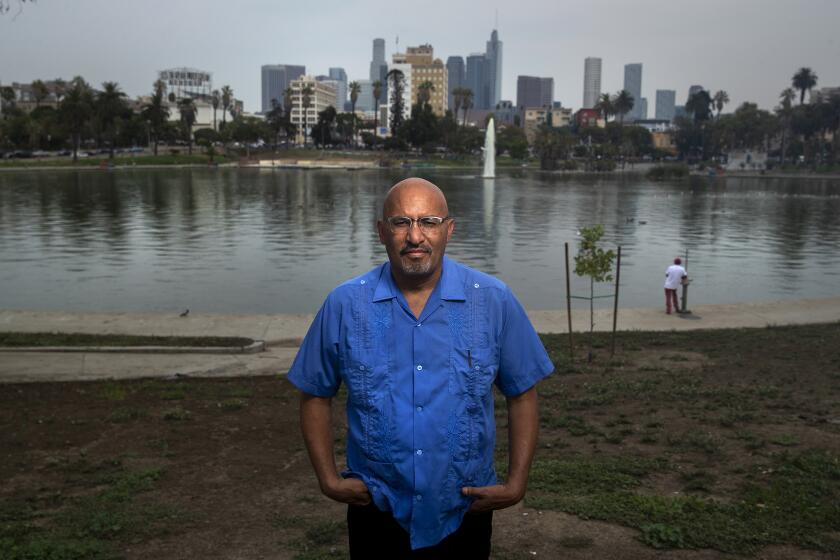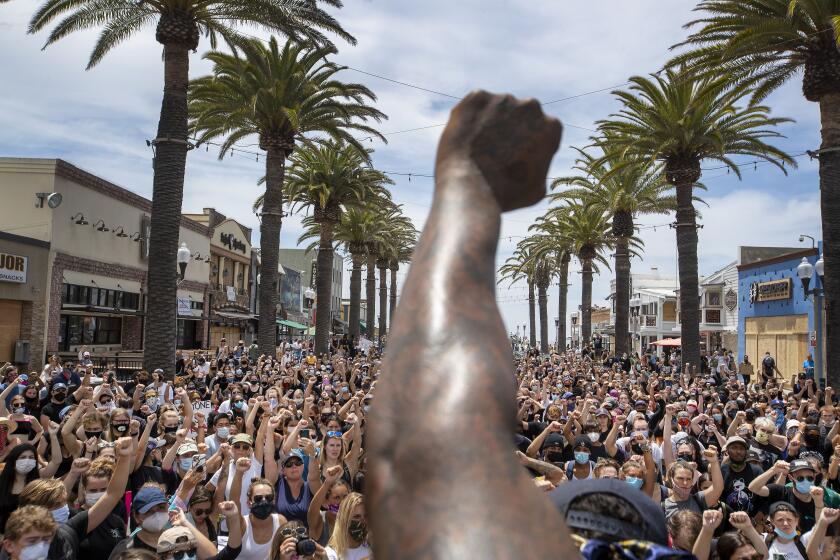How a rootless orphan pieced together an identity — and a mission
On the Shelf
Aftershocks
By Nadia Owusu
Simon & Schuster, 320 pages, $26
If you buy books linked on our site, The Times may earn a commission from Bookshop.org, whose fees support independent bookstores.
Loss, dislocation and rootlessness are deeply ingrained in Nadia Owusu. Born in Tanzania to a Ghanaian father and an Armenian American mother who left when she was 2, Owusu spent time in Italy, Ethiopia, Ghana, Uganda and England. When she was 14 her father, a United Nations official, died of cancer, leaving Nadia and her siblings in the care of a stepmother with whom she had an uneasy, even adversarial relationship.
But the ever-changing scenery also equipped Owusu, now 39, with skills vital to survival, and her father instilled in her a vast curiosity about the interconnected world, along with the ability to see it clearly but imagine it as it could be.
Those traits have served Owusu well, both in her public-policy career — she’s an associate director at the justice organization Living Cities — and in her new memoir, “Aftershocks.”
Employing earthquakes as an organizing metaphor, “Aftershocks” explores Owusu’s childhood and teenage years. As she moved among cultures and countries, frequently code-switching to fit in, the constants were her yearning for her mother, her rivalry with her stepmother and the seismic shock of her father’s death.
Framing the narrative is a period in Owusu’s late 20s when depression nearly consumed her. She writes that to heal, “I would need to interrogate the stories I told myself — about myself, about my family, about the world. My unsolved questions were about my mothers and my father. They were about loss, longing, and fear; about my abandonment …. But they were also about the borders and boundaries and fault lines on which we all live.”
Owusu finally put down roots in New York City, where she has now lived for more than half her life. She spoke via Zoom about how her father shaped her worldview and how she managed to write it all down.
In ‘Transcendent Kingdom,’ Yaa Gyasi’s second novel, she focuses on America — its promise and peril — and on one Ghanaian American family in Alabama.
At your lowest point you spent day after day in your apartment in a blue chair, trying to figure out how to move forward or whether you even wanted to. How did you find the words, a decade later, to convey the experience?
Back then I felt compelled to continue digging to find my way out from where I was. I spent a lot of time doing research about the cultures where I came from and journaling and writing for myself. Then I set it aside and thought I was going to write other things, but eventually I went back and looked at what I had compiled, and with some distance, I wondered if I might turn it into something.
The writing was a mess, but I was able to remember the emotions using those journals. Some parts were difficult to revisit but certain points in the process felt really healing too, because I did feel I had made progress in my life.
You started this book as a novel. Why and how did it become a memoir?
By writing a novel I felt like I could hide from some things and only write about the parts that I wanted to, but it was too close to my life to be fictionalized. I was in an MFA program and when I wrote some pieces in essay form my mentor immediately said, “Stop the novel. This is what you need to be doing.” I could see that was true.
You frequently shift from intimate, emotional observations to wider historical perspectives delivered more matter-of-factly, whether about skin tone or mental illness or even the phrase “hakuna matata.” Was this a conscious effort to broaden the book’s scope or simply how you see the world?
That’s how I think. It dates to my father. He always was pointing out how we fit into a place and what the history of a place was. Those kinds of curiosities have always been my curiosities too.
Part of what brought me to the blue chair was my disconnection — wanting to connect back to the cultures and places I came from and to understand them in a way I didn’t as a child. So even when I was just doing research for myself, I was trying to understand who I was, and also contextualizing my experience. With the book, I wanted to write myself closer to understanding all that.
In “Unforgetting: A Memoir of Family, Migration, Gangs, and Revolution in the Americas,” Roberto Lovato finally tells the full story of his rebel life.
Was it your father’s worldview that also led you to graduate school and your policy work?
Definitely. I want to understand how people belong to a place, how they make homes for themselves, how broader forces impact our lives and are playing out in our private moments. Politics and war and, you know, pandemics, and whatever else is going on.
Living Cities works on economic justice issues, but it has gone through its own reckoning. The organization had always worked on inequality in U.S. cities but without directly engaging with race and racism. That definitely felt crazy to me when I started working there. Now the mission is about closing the racial income and wealth gaps, explicitly naming the ways wealth and class are inextricably linked with race, particularly in the cities we work in. We want people to understand how inequality and segregation came to be in each place — what the role of local government was in creating that and how they can undo that.
The book’s scope reflects your global childhood. But you also write about the particular American brand of racism in sections on Hurricane Katrina and racism in policing. Were you surprised by what you found upon coming here?
I moved here at 18 for college and had to figure out what it meant to be Black in this country — understanding my body and Blackness in the context of America was a big part of my coming of age. I was really welcomed by the Black community.
I had experienced racism in other places but there’s something very particular about the experience here. It was much worse in reality than what I had learned in school, and it was often very upsetting. I did not change the book during editing in the last year, but I’m interested to see what conversations arise from the book now, in the context of everything that has happened.
Walter Mosley, Luis Rodriguez, the coiner of #BlackLivesMatter and others sketch a hopeful future for L.A. and the U.S. after George Floyd protests.
You address code-switching historically and personally. One boyfriend was surprised to hear you speak with a British accent. Do you feel guilty when you present yourself differently to different people or is that natural behavior, even if it’s politically fraught?
When people ask where I’m from, it’s complicated so I used to give different answers to different people based on what they thought they wanted to know but also what was most useful in how they saw me. Code-switching is a survival mechanism. People do it for all sorts of reasons, but I’ve felt shame about it.
It’s a complicated question, and there’s distrust of multi-voiced people. This [American accent] is the accent I speak with now, but these accents are all mine. I’ve been accused of faking accents, but I want to celebrate my multiplicity.
Do you still have the blue chair?
I put it out on the street when I moved out of that Chinatown apartment. I remember feeling good, like I don’t need it anymore.
More to Read
Sign up for our Book Club newsletter
Get the latest news, events and more from the Los Angeles Times Book Club, and help us get L.A. reading and talking.
You may occasionally receive promotional content from the Los Angeles Times.







